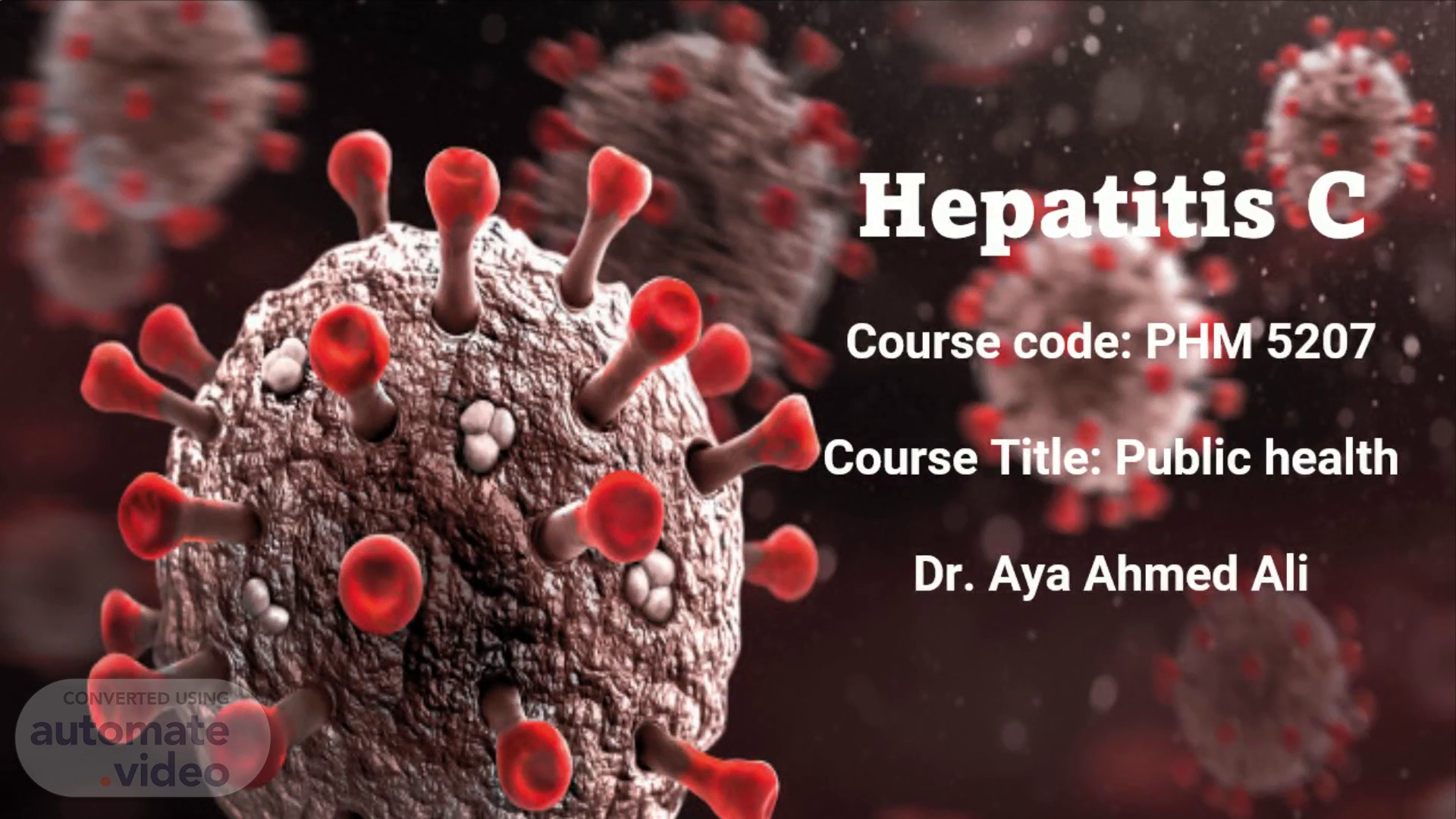Scene 1 (0s)
Hepatitis C. Course code: PHM 5207 Course Title: Public health Dr. Aya Ahmed Ali.
Scene 2 (9s)
ID NAME 101701801 حسناء عماد صلاح فايد 101701933 سلمى على احمد درويش 101703559 دينا طلعت احمد 101705062 زهراء أحمد ابراهيم 101702348 سلمي ضياء فاروق محمد الدمرداش 101704577 رنا محمد عبد العزيز علي 101703381 احمد طلعت فاروق 101701900 محمد اشرف حمدي محمد 101703791 سمرات طلعت موسي 101704348 سيف الدين عصام احمد.
Scene 3 (25s)
Introduction. Hepatitis C is a liver infection caused by the hepatitis C virus (HCV). Hepatitis C is spread through contact with blood from an infected person. For some people, hepatitis C is a short-term illness, but for more than half of people who become infected with the hepatitis C virus, it becomes a long-term, chronic infection. Chronic hepatitis C can result in serious, even life-threatening health problems like cirrhosis and liver cancer. People with chronic hepatitis C can often have no symptoms and don’t feel sick. When symptoms appear, they often are a sign of advanced liver disease. There is no vaccine for hepatitis C. The best way to prevent hepatitis C is by avoiding behaviors that can spread the disease, especially injecting drugs. Getting tested for hepatitis C is important, because treatments can cure most people with hepatitis C in 8 to 12 weeks..
Scene 4 (2m 7s)
Causes. 1-Injecting drugs 2-Sharing toothbrushes, scissors and razors 3-Tattooing and body piercing 4-Mother to child. 5-Unprotected sex.
Scene 5 (2m 53s)
Symptoms. Clay-colored poop Dark urine Fever Fatigue Jaundice (a condition that causes yellow eyes and skin, as well as dark urine) Joint pain Loss of appetite Nausea Stomach pain Vomiting.
Scene 6 (3m 21s)
Diagnosis. Hepatitis C is usually diagnosed using 2 blood tests: ✓the antibody test ✓the PCR test.
Scene 7 (3m 31s)
1-The antibody test:. The antibody blood test determines whether you have ever been exposed to the hepatitis C virus by testing for the presence of antibodies to the virus. Antibodies are produced by your immune system to fight germs. The test will not show a positive reaction for some months after infection because your body takes time to make these antibodies. If the test is negative, but you have symptoms or you may have been exposed to hepatitis C, you may be advised to have the test again. A positive test indicates that you have been infected at some stage. It doesn’t necessarily mean you are currently infected, as you may have since cleared the virus from your body. The only way to tell if you are currently infected is to have a second blood test, called a PCR test..
Scene 8 (5m 6s)
2-The PCR test. The PCR blood test checks if the virus is still present by detecting whether it is reproducing inside your body. A positive test means your body has not fought off the virus and you are currently infected..
Scene 9 (5m 40s)
3.Further tests:. 1-blood tests: These measure certain enzymes and proteins in your bloodstream that indicate whether your liver is damaged or inflamed. 2-ultrasound scans : Where sound waves are used to test how stiff your liver is; stiffness suggests the liver is scarred..
Scene 10 (6m 27s)
Prevalence and distribution in Egypt and around the world.
Scene 12 (7m 44s)
Treatment. Hepatitis C can often be treated successfully by taking medicines for several weeks. If the infection is diagnosed in the early stages, known as acute hepatitis, treatment may not need to begin straight away. Instead, you may have another blood test after a few months to see if your body fights off the virus.If the infection continues for several months, known as chronic hepatitis, treatment will usually be recommended..
Scene 13 (8m 28s)
Treatment plan. 1-tablets to fight the virus 2-A test to see if your liver is damaged ،Your doctor will also assess your liver for damage (scarring), either with a blood test or a scan called a fibroscan. 3-lifestyle changes to prevent further damage 4. During treatment, you should have blood tests to check that your medicine is working. If it’s not, you may be advised to try another medicine. 5.At the end of your treatment, you’ll have a blood test to see if the virus has been cleared and a second blood test 12 or 24 weeks after treatment has stopped. If both tests show no sign of the virus, this means treatment has been successful..
Scene 14 (10m 1s)
Hepatitis C medicines. Hepatitis C is treated using direct-acting antiviral (DAA) tablets. They are the safest and most effective medicines for treating hepatitis C. They’re highly effective at clearing the infection in more than 90% of people. The tablets are taken for 8 to 12 weeks. The length of treatment will depend on which type of hepatitis C you have. Some types of hepatitis C can be treated using more than 1 type of DAA..
Scene 15 (10m 44s)
NHS-approved hepatitis C medicines include:. Sofosbuvir A combination of ledipasvir and sofosbuvir A combination of ombitasvir, paritaprevir and ritonavir, taken with or without dasabuvir A combination of elbasvir and grazoprevir A combination of sofosbuvir and velpatasvir A combination of sofosbuvir, velpatasvir and voxilaprevir A combination of glecaprevir and pibrentasvir Ribavirin..
Scene 16 (11m 21s)
Prevention. 1-Injection drug use is the most common way people get hepatitis C. Avoid injecting drugs to reduce your risk. If you do inject drugs, use sterile injection equipment. 2-Avoid sharing personal care items that might have blood on them (razors, toothbrushes, nail clippers) 3-If you are a health care or public safety worker, follow universal blood/body fluid precautions and safely handle needles and other sharps 4-Choose tattoo and piercing parlors carefully. 5-If you’re having sex use latex condoms correctly and every time to prevent the spread of sexually transmitted diseases, including hepatitis C..
Scene 17 (12m 37s)
References:. References: https://www.mayoclinic.org/diseases-conditions/hepatitis-c/symptoms-causes/syc-20354278 https://www.sfcdcp.org/infectious-diseases-a-to-z/hepatitis-c/ https://www.cdc.gov/hepatitis/hcv/index.htm https://www.nhs.uk/conditions/hepatitis-c/treatment/ https://journals.plos.org/plosone/article?id=10.1371/journal.pone.0246836.
